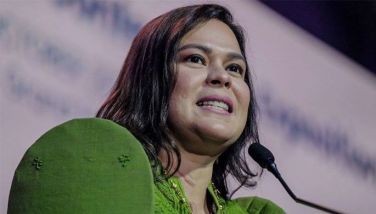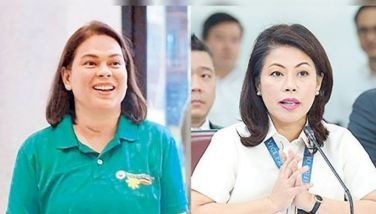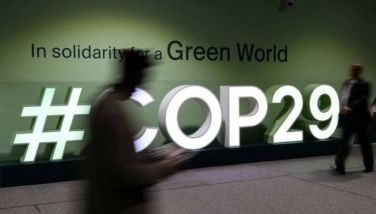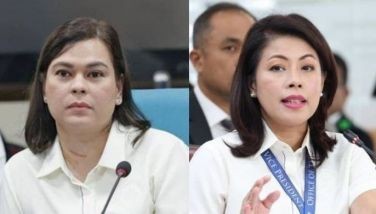‘CPR’ meant to suppress right to free expression, SC told
April 5, 2006 | 12:00am
Critics told the Supreme Court yesterday that the Arroyo administration’s "no permit, no rally" policy and its so-called "calibrated preemptive response" (CPR) towards street protests violate the right to free expression and peaceful assembly in yesterday’s oral arguments on three petitions questioning the anti-rally policies.
Lawyer Theodore Te, who represented one of the petitioners, said the government’s main basis for enforcing the policies, Batas Pambansa 880, should be considered "void for its vagueness."
Mayors have the discretion to deny permits if a rally poses a "clear and present danger" but Te pointed out that this definition is too broad.
"Section 6 of BP 880 is vague simply because the law did not tell the mayor what is a clear and present danger," Te told the High Tribunal.
"Under the Revised Penal Code, no law shall be passed to abridge the people’s freedom of speech. These rights are guaranteed and protected by the Constitution. Permit to rally must not be denied but be simply regulated. The people have the protected rights to freedom of expression to petition the government for redress of grievances, not destruction of government."
Te said courts should have the discretion on whether or not a rally permit should be granted or denied. "That should be best left to the court because the mayors are not the proper authority to do that."
He added that the government’s CPR in dealing with street protests were likewise vague. "We don’t know what it means. That is why it is void for vagueness because the rule itself did not explain it."
Te said the "legal remedy is not to stop the rally, but to arrest, charge and put the unruly rallyist in jail. The government is armed with enough laws to do that. Stopping rallies to suppress anti-government efforts is not the proper response to this problem."
Lawyer Emilio Saladero, who represented the Kilusang Mayo Uno militant labor union, emphasized that applications for rally permits are often denied.
"In most cases, the application for permit to rally is not acted upon or junked by the local chief executive. But if a permit is issued, they are also not recognized by the police and the rallies are dispersed, sometimes violently because of the calibrated preemptive response," he said.
Batas Pambansa 880 was passed in 1985 to counter rising street protests against the Marcos dictatorship, which was toppled the following year after a "snap" presidential election that was marred by massive cheating by Marcos.
The Arroyo administration reiterated the policies last year to counter street protests calling for her resignation over the political opposition’s allegations that she cheated her way to victory in the 2004 presidential election.
Opposition groups have stepped up their efforts after she survived an impeachment bid in the House of Representatives in September.
Mrs. Arroyo warned that her administration "will not tolerate activities that hurt the people and that undermine the rule of law."
She said the democratic rights to free expression and peaceful assembly were not licenses to flout the law.
Lawyer Theodore Te, who represented one of the petitioners, said the government’s main basis for enforcing the policies, Batas Pambansa 880, should be considered "void for its vagueness."
Mayors have the discretion to deny permits if a rally poses a "clear and present danger" but Te pointed out that this definition is too broad.
"Section 6 of BP 880 is vague simply because the law did not tell the mayor what is a clear and present danger," Te told the High Tribunal.
"Under the Revised Penal Code, no law shall be passed to abridge the people’s freedom of speech. These rights are guaranteed and protected by the Constitution. Permit to rally must not be denied but be simply regulated. The people have the protected rights to freedom of expression to petition the government for redress of grievances, not destruction of government."
Te said courts should have the discretion on whether or not a rally permit should be granted or denied. "That should be best left to the court because the mayors are not the proper authority to do that."
He added that the government’s CPR in dealing with street protests were likewise vague. "We don’t know what it means. That is why it is void for vagueness because the rule itself did not explain it."
Te said the "legal remedy is not to stop the rally, but to arrest, charge and put the unruly rallyist in jail. The government is armed with enough laws to do that. Stopping rallies to suppress anti-government efforts is not the proper response to this problem."
Lawyer Emilio Saladero, who represented the Kilusang Mayo Uno militant labor union, emphasized that applications for rally permits are often denied.
"In most cases, the application for permit to rally is not acted upon or junked by the local chief executive. But if a permit is issued, they are also not recognized by the police and the rallies are dispersed, sometimes violently because of the calibrated preemptive response," he said.
Batas Pambansa 880 was passed in 1985 to counter rising street protests against the Marcos dictatorship, which was toppled the following year after a "snap" presidential election that was marred by massive cheating by Marcos.
The Arroyo administration reiterated the policies last year to counter street protests calling for her resignation over the political opposition’s allegations that she cheated her way to victory in the 2004 presidential election.
Opposition groups have stepped up their efforts after she survived an impeachment bid in the House of Representatives in September.
Mrs. Arroyo warned that her administration "will not tolerate activities that hurt the people and that undermine the rule of law."
She said the democratic rights to free expression and peaceful assembly were not licenses to flout the law.
BrandSpace Articles
<
>
- Latest
- Trending
Trending
Latest
Trending
Latest
Recommended
November 23, 2024 - 12:00am





























